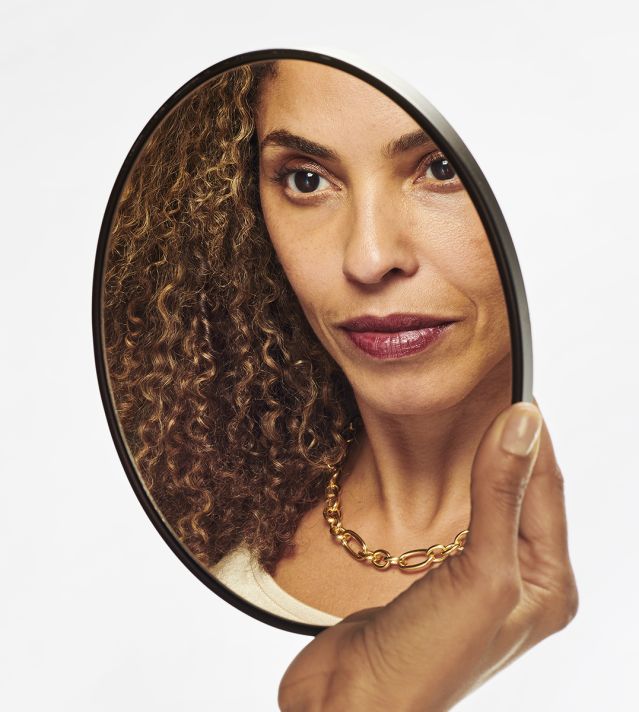Who Is the True You?
The “true” self may or may not exist, but our ideals and projections about it sure do.
By Psychology Today Contributors published July 6, 2021 - last reviewed on July 6, 2021

The True Self Is…
The Person You Want Others To Believe You Are
By Rob Henderson
What does it mean to be authentic?
In his popular interview with Joe Rogan, the bestselling author David Goggins revealed his biggest fear. Goggins had a terrible childhood, grew up to be morbidly obese, and experienced a lot of hardship in his early adult life. Then he became a Navy SEAL, ultra-marathon runner, and renowned motivational speaker.
Goggins stated that his biggest fear is that he dies, and God (or whoever God assigns the task to) shows him a board with a list of accomplishments: physically fit, Navy SEAL, pull-up record holder, inspirational speaker who helps others. Goggins imagines saying, “That’s not me.” And God responds, “That’s who you were supposed to be.”
In a fascinating paper about the “true self” and authenticity, social psychologist Roy Baumeister theorizes that the feeling of authenticity (or lack thereof) comes from whether or not we are acting in line with the reputation we want. In other words, we feel most in line with our true self when we achieve our desired social image. Failure to achieve it, or losing it, makes us feel less authentic.
When caught doing something they’re ashamed of, people say things like, “That’s not who I am” or “That wasn’t really me.” They are implying that reputation-damaging acts are not reflective of their true self. This doesn’t mean they are lying: Many people really believe their shameful acts are not reflective of who they are deep down.
Tying the rewarding sense of authenticity to reputation makes sense, as Baumeister explains: “If the main purpose of the self is to integrate the animal body into the social system (so it can survive and reproduce), then cultivating a good reputation is a paramount concern, and when one succeeds, even momentarily, there will be a welcome feeling of ‘That’s me!’” As evolutionary psychologist Geoffrey Miller has noted, behaviors do not arise just because they happen to feel good. Feeling good evolved to motivate the behavior, which likely has some evolutionary payoff. The good feeling is there to get us to do more of that beneficial behavior.
Indeed, there is empirical evidence that people feel more authentic when they behave in an extraverted, agreeable, conscientious, emotionally stable, and intellectual manner. Put differently, people seem to feel more authentic when they are doing things society values. Intriguingly, other research suggests that feelings of authenticity are sometimes higher when people go along with outside influences. In a study by Alison P. Lenton and colleagues, participants tended to report both a stronger sense of behaving authentically and greater acceptance of external influence when they were in social contexts, such as with friends, compared with when they were alone.

Other researchers have linked concepts of the “true self” to the good or honorable self as well. A review led by Nina Strohminger suggests that people think the true self is morally righteous. We seem to believe that authenticity is inextricably tied up with our views about what it means to be a good person. If someone is living a morally reprehensible life, we are likely to feel they are “living a lie.”
Is our true self just a sheep that goes along with what society expects us to do?The true self, Baumeister and other researchers suggest, isn’t actually a real thing: It’s an idea and an ideal.
The true self is how we fondly imagine we could be. When we act in accordance with that ideal, then we think, That’s who I am. When we stray from it, we think, That’s not me.
A related idea has been discussed by the psychologist and relationship researcher Eli Finkel, who talks about the Michelangelo phenomenon. “In Michelangelo’s mind,” Finkel writes, “the David existed within the rock before sculpting began.” The idea is that in healthy marriages, each partner helps foster the other’s best self.
But Baumeister’s idea is that we have our own vision of our best self (which we believe is our true self) and feel more authentic when we act closer to that ideal. What people think of as their true self is the version of themself that holds a solid reputation. The idealized self that makes a positive impression on peers they respect. When they inch closer to that ideal, they will feel good—and authentic.

The True Self Is…
The Person You Meet On Introspection
By Abigail Brenner, M.D.
By the time we’ve lived a few decades, a lot has happened to us—the changes and challenges that we expect in the course of living, as well as the ones we don’t expect. But after many life tasks are mastered, many goals reached and lessons learned, some basic questions often remain: Who are we in all of this? Who are we at our core, apart from anybody or anything else? Do we ever have a chance to be that core person in a relationship? Do we ever have a chance to be that person for ourselves?
From the time we’re born, we’re conditioned to be a certain way. First, there’s the influence of our parents, siblings, and extended family. Then, the peer group. Then, our intimate relationships. We become different things to different people when we relate to others. We take on many roles and identities in the course of our lives. Some of these encourage and expand our core sense of self, while others diminish and stifle who we are.
Unusual events—like the periods of staying at home that so many experienced as a result of COVID-19—give us the unique opportunity, if we want it, to discover more about who we are at our core. When life is lived in its usual, “normal” way, we attach a level of importance to the activities that constitute our daily life. But when we can’t engage life in that way, the focus may shift to what we’re left with—ourselves, our loved ones, our immediate environment. We may reflect on our lives, what is really important, and how life could be lived differently and better.
You know yourself better than anyone else. If you never considered this before, it’s time to start thinking about it. Throughout your life, others may have tried to tell you that they know you better than you know yourself. Ask yourself now: “Without all of the roles and identities I’ve acquired in the course of living, who am I? What do I want for myself?” You don’t need anyone’s permission to do what feels right to you, to do what feeds and nourishes you.
Don’t let others’ expectations limit who you are. What others expect of you is a reflection of who they are—their own wants and needs. It’s the way they want you to be so you can be a part of their life. But there is more to life than pleasing people and trying to fit into their life. Anyone who insists on limiting your true expression is not respecting and honoring you. And that goes for self-limitations, too: If you have been unfairly limiting yourself, now is the time to revisit and rediscover those experiences, hopes, and dreams that you’ve buried away.
Take risks. Begin to speak up, to say what’s on your mind. Express yourself through your ideas, creativity, and individuality. Do things you’ve been afraid to do in the past for fear of failure, of being ashamed or embarrassed, of not being good enough. Embrace spontaneity.
Surround yourself with those who value and respect who you are. Spend your time with people who lift you up and celebrate what you do. Limit your relationships with those who give you an unnecessarily hard time.
Find a purpose. Purpose is a symbol of what you’re doing, what you want to accomplish while you’re alive. A purpose, a reason for being, is a good way to remind yourself of who you are—because who you are is essential for accomplishing that bigger goal.
---------------------------
The Silent Self:
You, beneath thought and feeling. What do you have in common with all living beings?
By Jeremy Sherman , Ph.D.
Humans are naturally self-obsessed. We wonder who we are and what we should do with our lives. We think about how we appear to others. We ride the slurry of sensations, feelings, emotions, and thoughts about ourselves coursing through us.
But for all our self-concern, we are practically oblivious to our core self, the fundamental selfhood upon which rests everything that matters to us. We like to feel alive, but most of what it takes to be alive is unfelt and unconscious. It’s the silent self working away all day and night, repairing and regenerating our “self.”
A few fun facts about your silent self and its activity on even your laziest day: You shed tens of thousands of skin cells every minute, which your body replaces. You produce as much as one-third of a gallon of saliva every day. Your heart pumps around 1.5 gallons of blood every minute. Your two kidneys clean roughly half a cup of blood every minute. You generate about 2 million red blood cells per second.
And today, I bet you didn’t even notice all that regenerative activity. Who does? That’s the point. We don’t sense it, but if it stopped, we’d die. When we think about Darwin’s “struggle for existence,” we think of animals fighting. That’s not the core struggle that runs silently in every living being, the struggle to regenerate our degenerating bodies. We’re often reminded to get out of our heads and get in touch with our bodies. But that’s still not getting in touch with this core self.
Your core self is what you have in common with plants, fungi, bacteria. All living things have what’s termed “vegetative sentience,” not sentience as feeling but as responsiveness, the way a plant heals itself in response to being cut. Indeed, when people enter a coma or “vegetative” state, neither feeling nor thinking, all that’s left of them is their vegetative sentience.
The silent self can surface as loud, felt symptoms when we’re sick. But when we’re well, we can’t feel it and hardly give it a thought.
We live upstairs from the efficiently humming boiler room of activity that keeps us alive. Over the years, I’ve come to appreciate intellectually the least intellectual part of me, running silent and deep.
---------------------------

The True Self Is…
A Person Who Often Feels Fraudulent
By Eric Jannazzo, Ph.D.
“I feel like a total fraud.”
I can only guess at the number of times I’ve heard that said in my therapy office. I’ve heard it from all ages and from just about every walk of life: from the professor and from the executive; from the engineer and from the homemaker; from the artist and from (gulp) the surgeon.
The feeling is as durable as it is ubiquitous: It appears to remain largely unaffected by years of training, by decades of success, by winning prestigious awards and honors. In fact, the awards and honors are often fuel on the fire of a sense of fraudulence. “If people only knew.” The secret becomes even bigger.
In my years of practice, I’ve been shocked to come to realize how many people privately feel like total fakes. How is it that the world continues to go round and round and yet is populated by such a flotilla of abject frauds?
While no doubt more than a few people have bluffed their way into positions of authority, the obvious truth is that many perfectly competent people have a tendency to feel as though they’re getting away with the secret truth of their incompetence, when in fact they are doing no such thing. Why such rampant distortion in self-concept? Why do so many people who are clearly up to the task feel as though they are pulling the wool over everyone’s eyes?
I think much of this has to do with our interiority: We are all-too-painfully aware of our inner experience and its roiling pool of self-admonishments, longings for do-overs, and crises of confidence, big and small. We are aware of all the vulnerabilities that must privately be managed. We are aware of the gap between our interior and our largely constructed exterior, and we believe the existence of this gap means we are fraudulent.
Our health- and image-obsessed culture promotes the idea that outer beauty and ease are a reflection of an internal life that looks much the same. Many have come to believe that the smoothness of our interiority is the true measure of ultimate success. We yearn to be seen as successful in this way, and we may present as though we have ascended that mountain of tranquility. And yet we alone know the secret truth: We are each, at times, a quivering, heaving, throbbing crockpot of insecurity. And we may believe (erroneously, of course) that the smooth Insta-
gram exteriority of others is a reflection of their inner conviction and utter lack of any anxiety or darkness to be managed.
Others have achieved true mastery, while we only pretend to.
The truth is, to be genuinely fit for a role, any role, we must be able to successfully manage the pieces of ourselves that do not fit within it. We must manage our doubts, we must manage our shadowy pieces—our aggression, our covetousness, our selfishness, our frailties. We all must curate our interiority to show up in the ways we need to, professionally and often personally. To do this well is not to be a fraud; it is to be the genuine article. Just read a memoir (if halfway decent and at least fractionally honest) of anyone—anyone at all.
Even so, many of you will be thinking: Well yeah, okay, it makes sense. But not for me. I really am kind of a fraud. And the overwhelming likelihood is that, despite the intensity of that feeling, you are not. You are, however, plagued by the same secret doubt and shadow that is the baseline challenge for any living human being. And if you’ve gotten through this day so far, largely and convincingly showing up in your chosen roles as though that weren’t the case, I sincerely congratulate you on a job well and truly done.
The True Self…
Says What It Feels
By Matt Huston
When annoyance swells up inside or a friend shares an opinion that we disagree with or we know something that others don’t want to hear, some of us will mute our facial expression and bite our tongue. And some of us will tell others what we truly think. The response depends partly on the situation: You’re surely more likely to “tell it like it is” with a best friend than when meeting with future in-laws. But a group of psychologists proposes that the overall degree to which a person tends to reveal inner thoughts and feelings, even unpleasant ones, is a relatively stable individual difference. They call it, simply, “realness.”
Realness, the team recently argued in the Journal of Research in Personality, is a key component of authenticity. Specifically, they describe being real as “acting the same way on the outside that you feel on the inside, regardless of the social consequences,” says Chris Hopwood, a psychologist at the University of California, Davis. “A lot of times doing that is beneficial—people like it, and you feel good about yourself. Sometimes, doing it gets you into big trouble. But those of you who value being real don’t care—you do it whether it’s going to get you in trouble or not.”
To assess the concept of realness and start to explore it in actual people, Hopwood and colleagues developed a 12-item Realness Scale and administered it to hundreds of participants and people who knew them. Across a series of studies, they found that scores for realness tended to be correlated with ratings on personality traits that are considered adaptive—such as extraversion and conscientiousness—and associated with lower neuroticism.
The relationship between realness and the trait of agreeableness was less clear, possibly reflecting differences in how people perceive realness in themselves and in others. Agreeable people can be as real as bristly ones, Hopwood notes, though they may differ in their delivery.
While realness is not the only aspect of authenticity—self-awareness, capacity for reflection, and other factors have been proposed to enable people to be true to themselves—the researchers behind these studies argue that realness has a central role. Someone can have plenty of self-insight, Hopwood says, but how “authentic” can they be if they don’t express their inner thoughts and feelings when the time comes?
Realness Scale
Please read the following statements and indicate how accurate each statement is of you, in general. Is it False, Slightly True, Mainly True, or Very True?
At times I say what people want to hear rather than what I want. (r) _____
I do what works best for the situation even if it is not how I feel. (r) _____
Others might see me as fake. (r) _____
It would take a lot for me to tell someone they have hurt me. (r) _____
I tell the truth even if it makes others unhappy. ______
I say what I believe even if people don’t like it. _____
I sometimes act like I believe what others believe. (r) _____
I tend to tell others exactly what I think even if it causes conflict. _____
I avoid sharing desires that others may not approve of. (r) _____
I express my needs and desires directly. _____
I share my feelings with others even if it upsets them. _____
I tell people what I want even if they may not want the same thing. _____
How to score:
Write down the numbers corresponding to your response for each item.
For items marked (r): False = 4, Slightly True = 3, Mainly True = 2, Very True = 1.
For items not marked (r): False = 1, Slightly True = 2, Mainly True = 3, Very True = 4.
Add the numbers for all items and divide the total by 12; this is your Realness Scale score. In an online survey of 1,004 people, the mean score was 2.83.
Submit your response to this story to letters@psychologytoday.com. If you would like us to consider your letter for publication, please include your name, city, and state. Letters may be edited for length and clarity.
Pick up a copy of Psychology Today on newsstands now or subscribe to read the rest of the latest issue.
